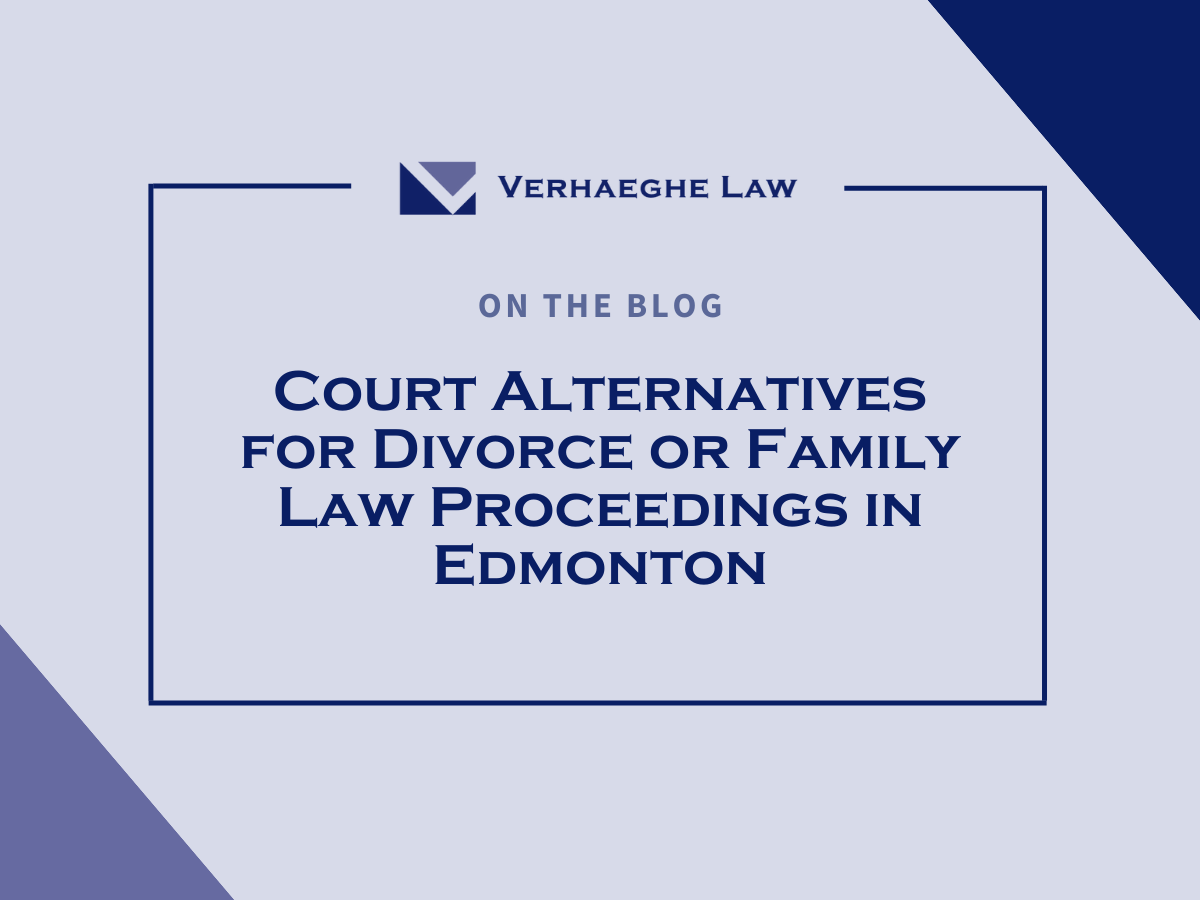Court Alternatives for Divorce or Family Law Proceedings in Edmonton

The end of a relationship, be it a marriage or adult interdependent partnership, can be one of the most challenging times in a person’s life. While most people wish to pass through the inevitable anguish of a separation with as much respect and grace as possible, it may be challenging to maintain objectivity in a highly emotional time.
Sometimes, it may be necessary to go to court in order to resolve the issues of a divorce. However, if both parties are willing, there are court alternatives for divorce or family paw proceedings in Alberta, which may prove more cost- and time-efficient. To learn more, including how the divorce lawyers at Verhaeghe Law may be able to help, contact us today.
Family Mediation
One of the court alternatives for divorce or family law proceedings in Alberta, family mediation offers the separating spouses an opportunity to meet alongside a neutral third party to discuss the terms of their separation. The mediator may offer guidance throughout the conversation, helping shepherd respectful agreement-oriented discussion as to matters of spousal and child support, parenting plans, the division of property, and more.
When is family mediation a good option? With a family mediator acting as an outside eye, the onus is ultimately on the separating spouses to come to a mutually satisfactory agreement as to their separation. This court alternative may be best in circumstances where both parties are actively willing to collaborate.
Arbitration
Similar to family mediation, arbitration involves a neutral third party meeting with the separating spouses to help guide discussion as to the terms of the separation or divorce. Unlike family mediation, an arbitrator acts similarly to a judge. Guided by what they receive from both parties, the arbitrator may decide on issues, and make binding orders.
Parenting Coordination
Couples who share children may benefit from the collaboration of parenting coordinators, who support dispute resolution for families. Typically, parenting coordinators are social workers or psychologists hired by the separating parties to help in the decision-making process when it comes to children.
Matters in which parenting coordinators may be able to help include:
- Articulating and agreeing on plans for day-to-day parenting
- Coming to an informed decision if the parents are unable to agree
- Helping to resolve disagreements as to existing parenting arrangements
A parenting coordinator cannot change custody arrangements, nor can they enact large changes to access schedules. If you are wondering how to change or appeal a divorce related child custody order, contact our Edmonton divorce lawyers today.
Collaborative Family Law
In collaborative family law, the separating spouses and their respective lawyers work together in search of a resolution. This is distinct from the traditional court approach, in which separating spouses and their lawyers typically work against each other.
The benefits of collaborative family law include:
- The separating parties retaining control over their own decisions
- A spirit of collaboration that may foster good-will for any future issues
- The support of lawyers who have agreed to avoid court throughout this separation process
Should a collaborative family law process fail to result in a mutually agreed-upon separation, the separating parties may recommence the process in court. However, should they go to court, they have to hire different lawyers. To learn more, including what might be possible in our case, contact our Edmonton divorce lawyers.
Judicial Dispute Resolution
The purpose of a judicial dispute resolution (JDR) is to attempt to resolve a disagreement before the case goes to trial. In a JDR, the separating spouses and their lawyers meet with a judge in order to discuss the issues at hand.
Benefits of a JDR include:
- The mediation of a judge who may grant an order
- The process is private and confidential
- This pre-trial settlement meeting is run informally, possibly in a conference room
- It is a voluntary process that offers both parties an opportunity to seek resolution
Because a judge presides over a JDR, the result may be a binding agreement, negating the need to go to court.
Contact Our Edmonton Divorce Lawyers Today for a Consultation
Divorce is often a highly emotional, painful process. With the collaboration of both parties, however, it is possible to engage in a respectful approach through alternatives to court intervention. The dedicated support of an Edmonton family lawyer may be invaluable in ensuring you understand your rights, every step of the way. Contact us today to schedule your initial consultation.
** Please note, this article is intended as a general overview on the subject of divorce in family law, and is not intended to be legal advice. If you are seeking legal advice, please consult with an Alberta divorce lawyer.
